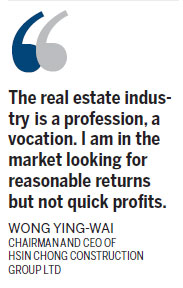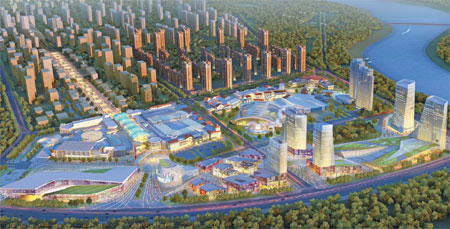In step with change
Updated: 2013-09-22 08:00
(China Daily)
|
|||||||
|
The effect picture of La Viva. The Hong Kong-based Hsin Chong Construction Group Ltd is ambitious to extend its business to the mainland market. Photos Provided to China Daily |


Q+A: Wong Ying-wai
A property guru says his sights are set on a future of sustainable success
Q: Hsin Chong Construction Group Ltd is relatively new to the mainland market. Can you briefly tell us the history of Hsin Chong and its latest developments?
Wong: Hsin Chong has 75 years of history. Our major business has been in construction, but throughout the past seven decades, we have evolved into a real estate company that provides a full range of services, including construction, engineering and property management. It is rather unique in Hong Kong for a company to offer such a comprehensive set of one-stop real estate services. For instance, we have a team of 6,000 professionals dealing with estate management, taking care of 300 properties. Our market covers Hong Kong, Macao, the Chinese mainland and overseas locations. Our latest development is a mixed-use project La Viva. It is positioned as an integrated "regional experience destination" that consists of retail, entertainment, a water world theme park, a hotel, residential apartments, an international school and office towers. It is located in Tieling New Town, at the heart of the Greater Shenyang Economic Region in Liaoning province. In a way, we are creating a new town with comprehensive amenities that aims to change suburban lifestyles.
Q: Why does Hsin Chong intend to develop new townships and communities in the second- and third-tier of cities rather than in the first-tier cities when it made the strategic statement at its Hong Kong headquarters in September 2012? What kind of business opportunities have you seen?
Wong: It has much to do with the overall development trends in China. The first-tier cities were booming in the 1980s and 1990s when there was a lot of room for property development. After 2000, first-tier cities' markets gradually saturated as property prices skyrocketed and the government intended to cool the market. Fierce competition not only came from Hong Kong developers but also from mainland counterparts, and the massive urbanization that heavily influenced the country's economic and social development. To seize the opportunities arising from China's rapid urbanization and my penchant for large property development project, our strategy is to invest in prime properties in first-tier cities while developing a series of large-scale, integrated new towns in second- and third-tier cities. These new towns are mega-, mixed-use developments with comprehensive and highly integrated facilities that offer employment opportunities, better education and innovative entertainment experiences to the emerging middle-class. They are new towns - new living spaces that will redefine suburban living.
Q: As a senior entrepreneur, how do you look at the future of China's real estate industry as it is still on the fast track of development today?
Wong: Despite some people saying that the golden decade of China's property has gone, I think the real estate industry is a profession, a vocation. I am in the market looking for reasonable returns but not quick profits. Look at the property markets in United States, Europe as well as Hong Kong - they continue to grow even after hundreds of years. Real estate is a long-term investment, and it all depends on how we man-age it and how much we devote to it. I see plenty of opportunities in the second- and third-tier cities, where they have huge room for development and upgrading but lack comprehensive design and planning to build integrated facilities for better communities, such as in the areas of entertainment and education. Right now, I am aiming at the emerging middle class, to bring them same quality of life as enjoyed in first-tier cities. We are investing more on both the hardware and software in our projects in the second- and third-tier cities by using the same - if not better - quality standards as those in the first-tier cities. Although this will make our projects more costly, we have the patience to wait for our followers. I am sure our projects will meet the needs of the rising middle class who are seeking a better quality of life.
Q: What is Hsin Chong's business target for the next five to 10 years?
Wong: Our business will focus on three directions. One is our traditional construction business where we are doing large civil engineering and building projects. For instance, our market share in the Macao market amounts to 60 percent. Of the eight universities in Hong Kong, we worked on the construction of five of them. We also built database centers for large companies, such as HSBC, China Mobile and NTT Communications. We are also constructing the major construction works for mass transit railway lines and the Express Rail Link connecting Hong Kong to the national high-speed network.
The other direction is our property management. We continue to strengthen our property management, which has already met the international standards of facility management. We cover not only security and cleaning but also energy conservation, concierge services, etc. We are currently providing facility management services for Hong Kong International Airport Tower, Hong Kong Police Headquarters, Asia Airfreight Terminal and more. We also provide one-stop-shopping service for projects overseas and on the Chinese mainland.
The third direction is our property development business. We have purchased mixed-use properties in Liaoning and Beijing. We are also looking into opportunities in Shanghai and other cities. A mixed-use property is beneficial for a developer. While residential apartment prices can be high or low, you can hold and manage the commercial properties for long-term, stable income for the company.

(China Daily 09/22/2013 page19)
